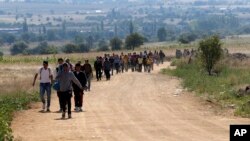German Chancellor Angela Merkel is planning to press ahead with efforts to forge a common European strategy on refugees, officials said, following another torrid week in the continent’s migration crisis that saw one central European country announce it would only accept Christian refugees and another unleash baton-wielding troops on migrants heading from the Balkans to western Europe.
Merkel and French president, Francois Hollande, were scheduled to meet Monday night in Berlin to renew efforts to tackle the biggest migrant crisis to engulf Europe since World War II. At the heart of their talks will be procedures to be adopted that would allow a clear distinction to be drawn between war refugees and economic migrants.
As German officials, along with their French counterparts, formed a chorus arguing that the migration crisis must be seen as a common problem and solved with common continent-wide solutions, thousands of migrants escaping poverty in Africa and refugees from war zones in the Middle East stormed across Macedonia's border after overwhelmed security forces gave up trying to stop them.
Overwhelmed
Just two days before, Macedonia declared a state of emergency and sealed its borders to migrants traveling from Greece. When it became clear the soldiers could not keep them out, Macedonia brought in trains to help them move on via Serbia to Germany and France.
“The government is organizing additional trains. I don’t know who is organizing the buses,” Alexandra Krause, a senior protection officer with the United Nations refugee agency, UNHCR, told Reuters. About 7,000 migrants, many women with babies and small children, crossed into Serbia over the weekend.
Greece itself has seen almost 160,000 people landing on its shores from Turkey since January, and U.N. agencies estimate 50,000 arrived on Greek territory just in the last month. U.N. agencies and rights groups have condemned both transit countries Greece and Macedonia for using force to disperse refugees and other migrants, and urged both to establish “orderly management” of the borders. They are, however, not alone in trying to slam their doors on newcomers.
“We have to accept this challenge and master it together,” German Interior Minister Thomas de Maiziere told reporters last week in Berlin. “We have to be prepared for high refugee numbers for several years.”
Almost 340,000 migrants tried to enter the European Union in July compared to 123,500 a year earlier, the EU border management agency Frontex announced last week. In the first three months of this year, about 83,175 people submitted asylum requests in Germany — 40 percent of the European total, according to the German government. Poland, the Czech Republic, Slovakia, Romania, Bulgaria and the three Baltic states only processed 6,080 applications collectively.
Sharing the burden
German officials are applying more pressure on central European states to accept that the burden of migrants has to be shared across Europe more evenly. They hope to make progress persuading EU member states to agree on common asylum laws ahead of a planned migration summit in November.
The migration crisis has seen politicians in central Europe and the Baltic states argue that the migrants streaming from the Middle East and Africa are western Europe’s problem as most are determined to head to the more prosperous West anyway.
Slovakia announced last week it would take in 200 Syrian Christians and not the 1,100 migrants the EU requested. The country’s prime minister, Robert Fico, told an Austrian newspaper that the crisis wasn’t his country’s fault. “I only have one question: Who bombed Libya?” Fico said. “Who created problems in North Africa? Slovakia? No!”
On Friday, German minister de Maiziere chided EU institutions for the slowness in their response to the huge influx of migrants and refugees, saying Germany cannot take in 40 percent of asylum seekers arriving in the 28-nation bloc indefinitely. “Europe, too, will play a central role in the search for solutions,” he said. “We won’t let our partners or the European Commission evade responsibility.”
In comments published in the German daily Bild am Sonntag newspaper, he decried violent protests against refugees mounted at a shelter in the town of Heidenau just outside of Dresden, saying, “This is unsavory and unworthy of our country.”
Backlash feared
With Europe’s immigration crisis worsening, politicians fear a mounting populist backlash against refugees and migrants. An opinion poll in Sweden suggested the anti-immigration Democrats have become the country's most popular party - underscoring that the traditionally liberal Nordic state is not immune from the rise of nationalist groups across the continent.
German officials told VOA they want to see new reception centers agreed on earlier this year in the frontline migratory states of Italy and Greece to be operational by the end of the year.
Along with Paris, Berlin is pushing for “harmonization” of asylum laws in Europe and agreement on which countries in Africa and the Middle East can be considered war zones. They want EU countries to speedily deport migrants who have been denied to remain in one state and bar them from just moving on to another to try their luck again.
Meanwhile, the Italian coast guard reported it had rescued 4,400 migrants from 22 boats attempting to cross the Mediterranean from Libya in recent days. Italy’s foreign minister, Paolo Gentiloni, warned the migration crisis is posing a major threat to Europe’s “soul.” He told Il Messaggero newspaper that “Europe is in danger of displaying the worst of itself: selfishness, haphazard decision-making and rows between member states.”







